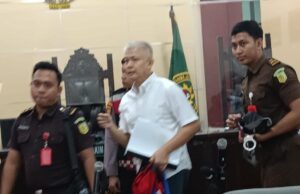
TANGERANG, POSINTERNASIONAL.COM.
The follow-up trial of the criminal case against defendant Charlie Chandra resumed at the Tangerang Class 1 District Court on Tuesday, July 29, 2025.
This time, the trial featured a land law expert, Arsim Lukman, S.H., brought in by the defendant’s legal counsel.
A crucial point in the trial emerged when the Public Prosecutor (JPU) questioned the expert regarding the legal consequences of the Deed of Sale and Purchase (AJB) that was suspected of being forged.
During the trial, the JPU highlighted the malicious intent of defendant Charlie Chandra, who deliberately used a fake AJB.
The defendant was aware of the legal issues, and even admitted to forging the signatures and thumbprints of other parties on the AJB.
This fact subsequently led to criminal implications for the other suspects, one of whom has died, but whose name is listed on the certificate.
The public prosecutor then questioned the legal implications of the derivative AJBs that had already occurred, given the subsequent legal action.
“Should the derivative AJBs be declared null and void by a court decision, or, after the criminal verdict has become final and binding, do they no longer have any evidentiary force?” the public prosecutor asked the expert.
Arsin Lukman, the expert, explained that fundamentally, a distinction must be made between the criminal and civil realms. If there is a criminal element, the criminal process must continue.
Regarding AJBs, Arsin stated that after a final and binding criminal verdict, the cancellation of the AJB must be pursued through a civil annulment application.
The public prosecutor then highlighted Form 13 filed with the National Land Agency (BPN) of Tangerang Regency.
The form states that the requested land is not in dispute and is physically controlled, and that all attached documents are valid.
If later proven false, the applicant is willing to be prosecuted according to applicable law.
The public prosecutor questioned the expert’s opinion if any of the form’s contents differ from the facts, given that criminal law pursues material truth.
Arsin Lukman emphasized the existence of two distinct disciplines. Criminal law pursues material truth, while administrative and civil law focus more on formal aspects.
“Those are two different things,” he said. He added that not all problematic administrative actions are criminal.
The public prosecutor again questioned the expert’s opinion regarding an applicant who deliberately applied for a certificate despite knowing that there had been legal problems with the land for decades, which ultimately resulted in the National Land Agency (BPN).
Which was initially unaware of the criminal decision, ultimately issuing a decision to cancel the certificate transfer.
Arsin Lukman explained that based on Minister of Agrarian Affairs Regulation (PMA) 397 Attachment 13, the authority to cancel a certificate transfer due to administrative or legal errors rests with the BPN Regional Office (Kanwil) or the Central BPN.
The Regency/City BPN is only responsible for implementing it immediately.
Another question posed by the public prosecutor was how to view a transfer of rights that is known to have previously involved a criminal problem, yet the process continues and formally appears to be clean and problem-free.
Is this purely an administrative matter, or are there criminal implications?
“If that’s the case, the criminal case must be supported by civil law so that both the Deed of Sale and Sale and Certificate can be revoked,” Arsin Lukman replied.
He reiterated that these are two different disciplines.
Regarding certificate cancellation, Arsin explained that it can be agreed upon through civil law. He also emphasized that the BPN Regional Office or the Central BPN should review the “history” or records related to the land.
“The certificate is a copy of the land register, so it’s very easy for the BPN to access it,” Arsin said.
The land register itself is held by the BPN and must be reported monthly, including information about any blocking or lawsuits.
Arsin Lukman concluded that the BPN doesn’t necessarily know about problems with certificates. Problems only become known when there is input from an external party, such as a court report or a blocking request from the police that is confirmed by the court.
(trisno)
Related Posts

He continued, stating that this poverty alleviation program could serve as a role model for future similar programs.

Therefore, she requested that SPPG officers carry out their duties properly and assume full responsibility before delivering and distributing food to children.

PEMKAB TANGERANG GELAR RAPAT KESIAPAN OPERASI PENGAMANAN DAN PENGATURAN LALU LINTAS ANGKUTAN TAMBANG.

Rising land values have the potential to trigger conflict, especially for waqf land that lacks legal certainty or when the waqf owner has passed

Dalam sambutannya, Bupati Maesyal Rasyid menyampaikan rasa syukur atas selesainya fasilitas dan sarana penunjang.

No Responses